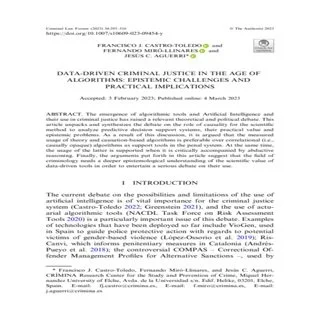By Francisco J. Castro-Toledo, Fernando Miró-Llinares & Jesús C. Aguerri
The emergence of algorithmic tools and Artificial Intelligence and their use in criminal justice has raised a relevant theoretical and political debate. This article unpacks and synthesizes the debate on the role of causality for the scientific method to analyze predictive decision support systems, their practical value and epistemic problems. As a result of this discussion, it is argued that the measured usage of theory and causation-based algorithms is preferable over correlational (i.e., causally opaque) algorithms as support tools in the penal system. At the same time, the usage of the latter is supported when it is critically accompanied by abductive reasoning. Finally, the arguments put forth in this article suggest that the field of criminology needs a deeper epistemological understanding of the scientific value of data-driven tools in order to entertain a serious debate on their use.
Crim Law Forum 34, 295–316 (2023).



